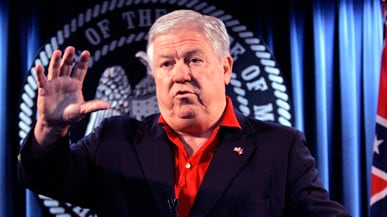Haley Barbour, the governor of Mississippi, is a burly, straight-talking, warm, and genial fellow. He is often talked of as a presidential candidate. If he does run, I'd advise him to brush up on his American history pretty quickly.

As Benjamin Sarlin reported on The Daily Beast, Barbour is offering a rosy picture of an organization throughout the Deep South in the 1950s and '60s known as the Citizens Councils. According to Barbour, who grew up in Yazoo City, Mississippi, the councils were benign, "an organization of town leaders hostile to the Ku Klux Klan… In Yazoo City, they passed a resolution that anybody who started a chapter of the Klan would get their ass run out of town."
That is not what I saw. I was in Mississippi in 1956 as a newspaper reporter from Britain. Traveling extensively for six months in the Deep South, I saw firsthand the activities of the White Citizens Council—as they called themselves then. They were just the Klan in a white collar.
I met many kindly, decent people throughout the Deep South, but rarely was anyone brave or imprudent enough to express outrage proportional to the outrages committed against the blacks.
• Michelle Goldberg: Is Haley Barbour a Racist?I spent time in Jackson with the belligerent Robert "Tut" Patterson, a plantation manager and one-time captain of the Mississippi State University football team who had become the chief recruiter for the councils. The interview was uncomfortable. He'd heard that I'd shaken hands with a black man and he was angry about that. He told me how he'd been signing up thousands of members all over the South at Kiwanis, Rotary, and Farm Bureau lunches. They were indeed "town leaders," as Haley Barbour says—clergymen, shopkeepers, politicians, bankers, auto dealers, lawyers, doctors, and dentists—but as Patterson and the evidence made clear, they were organized for one thing only: the repression of the blacks. The councils' weapons were not billy clubs but denial of work, credit, supplies, and housing as well as a boycott of any white newspaper advising compliance with the U.S. Supreme Court on any issue of segregation.
By 1957, only 5 percent of Mississippi blacks had been allowed to register to vote. The immediate past president of the U.S. Chamber of Commerce took me around black schools in Jackson to show me how happy the students were, and I asked him about this denial of the vote. "Only isolated cases," he said. The attorney general of the state was more blunt: "Yes, we don't encourage them," he told me in a disquisition on African-American inferiority. "Maybe a wrong was done to the babbling natives of Africa brought here, but I am not willing to accept that the race of Negroes can get to the same position in 200 or 300 years that yours and mine attained in several thousand years."
I met many kindly, decent people throughout the Deep South, but rarely was anyone brave or imprudent enough to express outrage proportional to the outrages committed against the blacks. I wish Haley Barbour could have met one such man, an unsung hero of American life. He lived in the small town of Petal, Mississippi, across the river from Hattiesburg. His name was P.D. East, and his house has just been firebombed when I turned up.
East was 33 years old, 6-foot-2 and heavy, a raw-boned product of the lumber camps, a million miles from the colonnaded pretensions of plantation homes set among their azaleas and Spanish moss. In the Army and in civilian life, heaving sacks in a store and working on the railroad, he had never thought twice about blacks and segregation before the Supreme Court ruling in Brown v. Board of Education.
He did not think much about them then, either. The year before he had talked himself into starting a weekly newspaper, the Petal Paper, having learned the ropes on a union paper. He worked 18 hours a day to build a six-page newspaper with 2,000 readers and was making money. He never entertained any thoughts of coming out against the mores of the society in which he had been born and raised. And then he found that he could not live with himself.
The way East put it to me was that he just got sick of the daily hypocrisies of the councils and the political leaders: a cunning law to stop blacks from voting; the humiliation of black leaders who'd been invited to a meeting called by whites to discuss the town's schools and then were told they couldn't stay because according to Mississippi state law, whites and blacks could not be in the same room together. "One Sunday last month," he said, "I was in my office and I felt that if I didn't say something about what was stuck in my craw, I'd explode." Who can imagine what a nightmare of the soul it was for a man like East to pull himself out of the swamp of deep-seated prejudice that had seemed a natural way of life, and do it in such a way as to hazard his livelihood and even his life?
East's epiphany took the form of a satirical column comparing the progress of his native state to that of a crawfish. Week after week he poked fun at the beasts of the "Magnolia Jungle," reckoning it was a waste of time to deliver sermons. He offered membership of the " Better Bigots Bureau," the privileges of which included "freedom to interpret the Constitution of the United States to your personal advantage"; "freedom to yell 'n***r' as much as you please without your conscience bothering you!" A typical send-up announced: "Don't suffer the summer heat by using your regular uniform of muslin bed sheet. Be modern! Inquire about our complete stock of cotton eyelet embroidery; Klanettes may enlarge the eyeholes for the arms, but your heads will fit nicely through the eyelets as they are."
East's telephone calls would tell him he was a n***r-loving, Jew-loving, communist son of a bitch. He met everything with humor. While he was stopped at a light in Hattiesburg with his window rolled down, a man on the curb said, "Aren't you P.D. East? If you'll get out of the car, I'll mop the street with you." East replied, "I'm sorry, that's not sufficient inducement."
The satirical Petal Paper found an audience—but more and more of them were out of state. The progressive Hodding Carter II wrote to East from Greenville, "I hope you leave a forwarding address." I'd send it to Haley Barbour, but P.D. East left this earth without leaving one, the archives of the Petal Paper remaining a testament to the valor of a fine American.
Part of Harold Evans' autobiography, My Paper Chase, just out in paperback, describes his travels in America.
Harold Evans, author of two histories of America, just published his memoir, My Paper Chase. Editor at large of The Week, he was editor of The Sunday Times from 1967-'81 and The Times from 1981-'82, founding editor of Condé Nast Traveler, and president of Random House Trade Group from 1990-'97.




